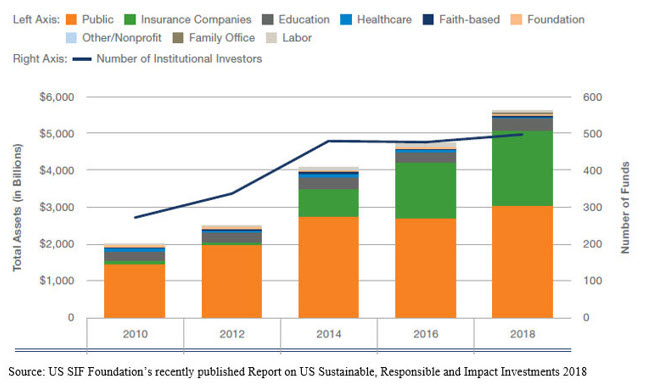Investors Are Voting With Their Dollars
March 28, 2019

Long a prominent topic in Europe, U.S. interest in ESG investing is growing.
Lisa Isaacson, Managing Director - Product & Marketing
Based on market data, chances are you know what Environmental, Social and Governance (ESG) investing is. In the case you don't, it is the idea of making investment decisions that include assessing not only the financial profile of a company but also whether that entity has developed standards and is working toward improving its environmental, social and corporate governance metrics. Topics of interest to investors range from greenhouse gas emissions to proxy voting and nearly everything in between.
Data show a significant increase in sustainable, responsible and impact investing over the past years, with the US SIF Foundation reporting nearly $12 trillion in assets invested with an ESG bias in 2018. Institutional assets represented more than $5 trillion of that total, a number that has more than doubled in the past six years.

As ESG factors have grown in prominence among stated investment goals, industry data to assist in decision making hasn't always been easy to decipher. Several information sources exist to assist investors in determining which companies share their particular ESG bias, whether that be environmental protection, corporate governance, sector participation or executive pay.
U.S. corporations are increasingly aware that ESG concerns are driving investments and - to that end - have begun issuing sustainability reports outlining their programs. The quandary is these reports aren't standardized, making comparisons difficult. Several institutional investors and scholars filed a rulemaking petition with the Securities Exchange Commission (SEC) in October 2018, urging it to standardize issuer reporting on certain ESG metrics to make it easier for the investing public to research companies. As of this writing, the SEC has not proposed any rulemaking, though we agree with the petitioners that it would be well within the SEC's jurisdiction to do so.
Earlier this quarter, both Fitch Ratings and Moody's announced the creation of methodologies to assist in assessing how ESG inputs may affect issuers in their rating universes. To be clear, both agencies have incorporated ESG factors in issuer ratings prior to 2019, but the announcements lend some formality and transparency in understanding how these inputs are considered in the ratings processes.
Institutional investors have more resources at their fingertips, with Bloomberg (the financial industry data leader) publishing peer-relative ESG scores from RobecoSAM, Sustainalytics, ISS and others. Bloomberg also offers an ESG menu that acts as a clearinghouse for investment research and developments on ESG issues.
While it's truly incumbent upon each investor to determine which ESG metrics are most important to them and do the research on issuers with parallel ideologies, the proliferation of resources is making those determinations easier. We believe ESG investing is hitting its stride in the U.S. and expect it will continue to be an investment focus for both individuals and institutions in the years to come.
Sources
Bloomberg
Fitch Ratings, Fitch Ratings Launches ESG Relevance Scores to Show Impact of ESG on Credit, January 7, 2019
Moody's Investors Service, Announcement: Moody's publishes new cross-sector methodology for assessing environmental, social and governance (ESG) risks, January 9, 2019
US SIF Foundation, Report on US Sustainable, Responsible and Impact Investing Trends, 2018
Williams, Fox, et.al, Rulemaking Petition to the SEC, October 1, 2018